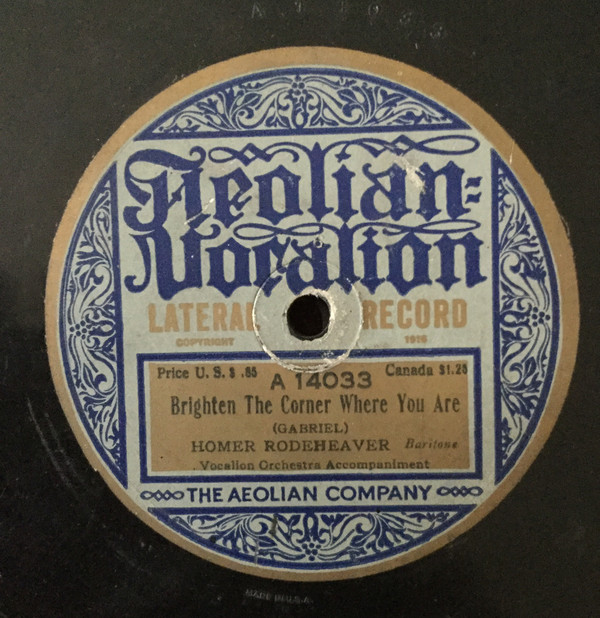MusiQ
Homer Rodeheaver - Brighten The Corner Where You Are Im Coming Home Mothers Prayers Have Followed Me
Album: Brighten The Corner Where You Are Im Coming Home Mothers Prayers Have Followed Me
Table of Contents
Download
Filename: homer-rodeheaver-brighten-the-corner-where-you-are-im-coming.rar- MP3 size: 13.8 mb
- FLAC size: 160.8 mb
Tracks
| Track | Duration | Preview |
|---|---|---|
| Mother's Prayers Have Followed Me | ||
| I'm Coming Home | ||
| Brighten The Corner Where You Are |
Images

Catalog Numbers
14033Labels
Aeolian VocalionListen online
- online anhören
- écouter en ligne
- ouvir online
- online luisteren
- ascolta in linea
- kuunnella verkossa
- lyssna på nätet
- escuchar en línea
- lytte på nettet
Formats
- Shellac
- 10"
- 78 RPM
About Homer Rodeheaver
American evangelist, music director, music publisher, composer of gospel songs, and pioneer in the recording of sacred music (October 4, 1880 December 18, 1955).
Born in Cinco Hollow in Hocking County, Ohio, he was taken as a child to Jellico in eastern Tennessee and there worked with his father in the lumber mill business. Although he learned the mountain ballads, he preferred Negro spirituals because they emphasized harmony and rhythm and had a "definite religious purpose." Rodeheaver early learned to play the cornet but switched to trombone while attending Ohio Wesleyan College, where he also served as a cheerleader.
In 1898 he left college to serve in the Fourth Tennessee Band during the Spanish-American War. Around 1904 he joined evangelist William E. Biederwolf as music director and then served, from 1910 to 1930, in the same role for Billy Sunday, the most popular evangelist of the period. (Shortly after Billy Sunday's death in 1935, Rodeheaver wrote a memoir of his relationship with the evangelist.)
Music Director for Billy Sunday
When Lowell Thomas presented Rodeheaver to the New York Advertising Club, Rodeheaver succeeded in getting the advertising agents to sing "Pray the Clouds Away." Will Rogers said, "Rody is the fellow that can make you sing whether you want to or not. I think he has more terrible voices in what was supposed to be unison than any man in the world. Everyone sings for Rody!" When Rodeheaver was introduced to John D. Rockefeller, Sr., on a golf course, Rockefeller delayed his golf game long enough to sing with Rodeheaver, "I'll Go Where You Want Me to Go, Dear Lord." In 1940, Rodeheaver led the singing for 250,000 people who attended the Wendell Willkie homecoming in Elwood, Indiana.
In the days before electronic amplification, Rodeheaver quickly discovered that his trombone could be heard when his voice or the piano could not. He often led congregational singing with his trombone, switching from playing to directing half way through the song and then allowing the trombone to hang on his arm at the elbow. During a Sunday tent campaign in Kansas, a heavy storm with near-hurricane winds caused the top and sides to sag, and a quarter pole fell, striking a woman on the head. When the crowd panicked and rose to flee, Rodeheaver began playing his trombone and the crowd quieted.
In his prime, Rodeheaver also used his baritone voice to good effect as a soloist and as a participant in ensembles composed of other members of Sundays evangelistic teamespecially duets with contralto Virginia Asher. During the heyday of the Sunday evangelistic campaigns, Rodeheaver directed the nations largest choruses: from a few hundred to as many as two thousand volunteers in Sundays various campaigns. To him there was nothing incongruous about having his choirs sing the gospel song "Master, the Tempest is Raging
Real Name
- Dr. Homer Alvan Rodeheaver
Name Vars
- H. A. Rodeheaver
- H. Rodeheaver
- Homer A. Rodeheaver
- Homer D. Rodeheaver
- Homer Rodheaver
- Rodehaver
- Rodeheauer
- Rodeheaver
